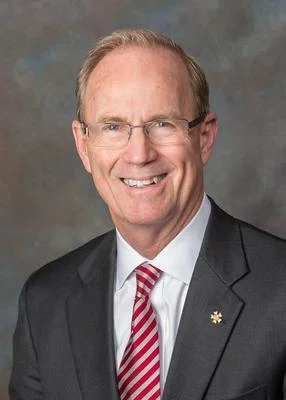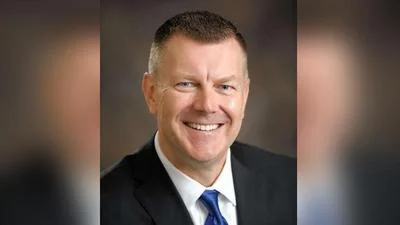Nicole Georgas, Shepard Middle School Parent | Nicole Georgas (X)
Nicole Georgas, Shepard Middle School Parent | Nicole Georgas (X)
In the wake of a scandal at Deerfield 109 school district in which a group of girls was allegedly forced to disrobe in front of a trans boy, Margot Henshaw, the owner of Glen Ellyn-based The Prince's Table and Liberty Luxury, is calling the treatment of students suffering from gender dysphoria "completely inappropriate."
Henshaw’s comments come after the U.S. Department of Education’s Office for Civil Rights (OCR) has opened investigations into the Illinois Department of Education, Chicago Public Schools District 299 and Deerfield Public Schools District 109 following complaints that female students were forced to share locker rooms with male students due to his gender identity.
The complaints also allege that administrators pressured girls to undress in front of the male student, despite their objections, raising concerns over the violation of Title IX, which prohibits sex-based discrimination in educational settings.
The investigation comes amid growing debates over gender identity policies in schools.
"Historically, Gender Dysphoria has been an extremely rare condition, so rare as to be virtually unheard of until recently," Henshaw told the DuPage Policy Journal. "Now there is an explosion of cases of this type of mental illness. The spike in numbers is enough to query whether all of these cases are genuine, or is there motivation for a pretext of suffering? Attention? Sports honors? Free Tuition?"
Henshaw argues that policies such as those at Deerfield Public Schools 109 undermine privacy and safety for students, particularly when it comes to shared spaces like bathrooms and locker rooms. She expressed concern that policies allowing transgender students to access facilities of their gender identity may lead to uncomfortable or harmful situations for other students, particularly young women.
“Of course young women (and young men) should not be made to share dressing areas or bathrooms with the opposite sex,” Henshaw said. “This is a deliberate coarsening of the culture, similar to discussing sexuality with grade school children. It does not matter whether the discussion is heterosexual or homosexual - either is completely inappropriate. What would be the purpose in distracting children from developing the building blocks of facile reading, basic math and clear communication - writing? We may not be able to discern the purpose, but the result is clear: One third of 8th graders in America are functionally illiterate.”
Henshaw emphasized that students should not be placed in a position where they are forced to object to sharing spaces with the opposite sex, especially when it comes to undressing. She argued that such situations are an invasion of privacy and disrespectful to students' modesty.
“Young people should never be put in the position of having to object to having a member of the opposite sex view him/her in a state of undress,” Henshaw said. “The fact that they have to defend modesty is simply wrong. If the school has a Gender Dysphoric student that is allowed to compete with students who are actually the opposite sex, the odd student can be provided with a private space in which to disrobe. Alone. Hopefully, this will all be over soon and youths born male will not be allowed to compete with those born female.”
Nicole Georgas, a parent of one of the teen girls involved in the incident, publicly testified at a District 109 School Board meeting on March 13.
Georgas recounted how her 13-year-old daughter and other girls were pressured by school administrators to undress in front of a male student who identified as female. The situation prompted Georgas to file a civil rights complaint with the U.S. Department of Justice, calling for separate facilities for biological males and females in schools.
Henshaw agreed with the concerns raised by Georgas and other parents, advocating for policies that protect students' privacy and safety.
“Local school boards need to make rules to segregate out any gender dysphoric students in lavatories and dressing rooms so as to protect the normal students to avoid embarrassment,” she said. “The normal students need the support and caring of adults, especially those in positions of authority.”
Henshaw also criticized the broader approach to gender dysphoria, expressing concerns about the medical and psychological treatment of individuals experiencing the condition.
“Gender Dysphoria needs to be treated by a mental health professional,” she said. “The mental health professional might be able to discern whether or not the subject was sincere or pretending to be afflicted. However, just as one would not treat drug addiction with offering more drugs, this condition, Gender Dysphoria, should not be encouraged with dangerous hormones mastectomies and orchiectomies. This is permanent mutilation of one's body and should not be permitted until after age 30, and only then at the subject's own expense. Insurance companies and the public should not get involved with enabling transgendering by paying for it or encouraging it in any way. That would be set up for a future lawsuit. And a waste of money.”
Henshaw’s comments echo a growing sentiment among those who believe that gender identity policies in schools, particularly those related to bathroom and locker room access, have gone too far.
She urged school boards to take stronger action to ensure that policies protect the well-being and dignity of all students.
“Children need absolutes and standards and operate well when given clear boundaries,” she said. “How confusing and unstable to be told that they are living in the wrong body, or that gender can be changed at will. The school boards need to step up to the plate and rid their districts of these sadistic adults they have put in charge of our most precious commodity, posterity.”






 Alerts Sign-up
Alerts Sign-up